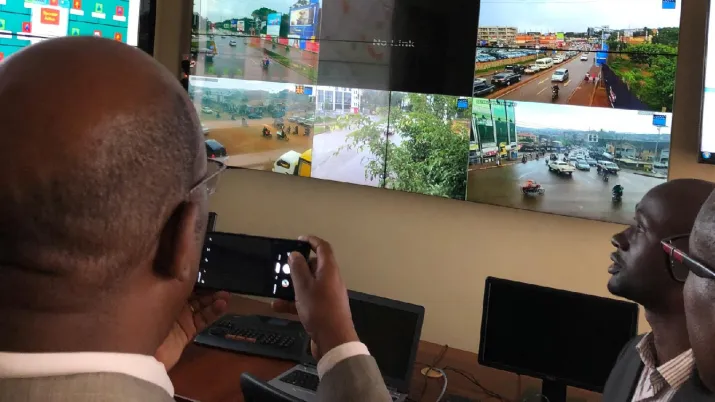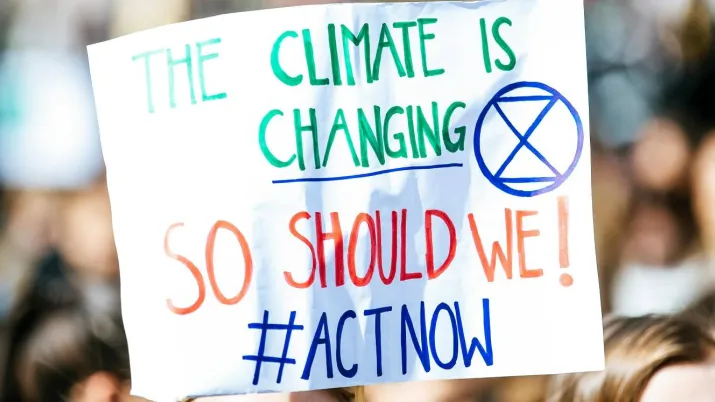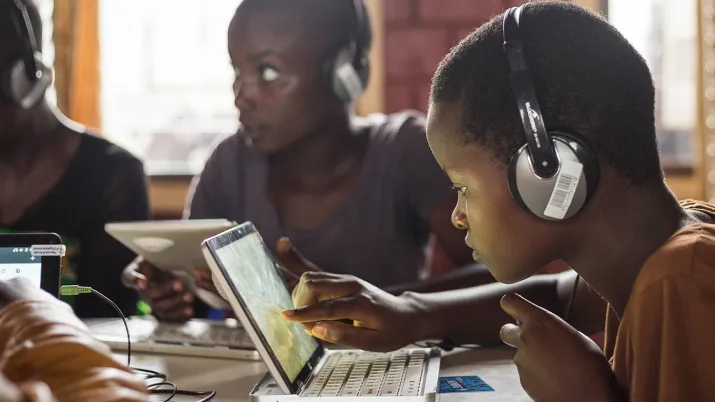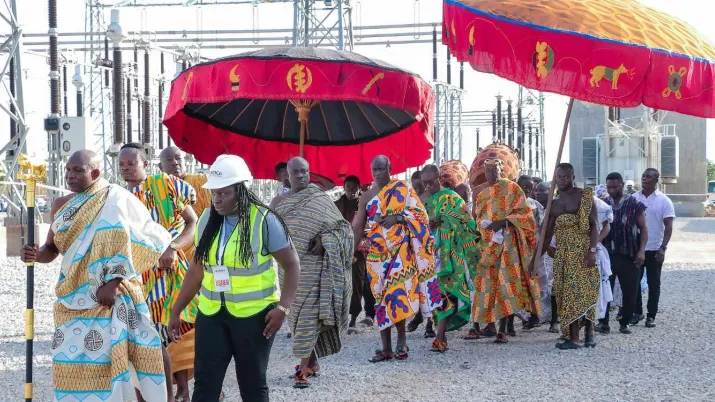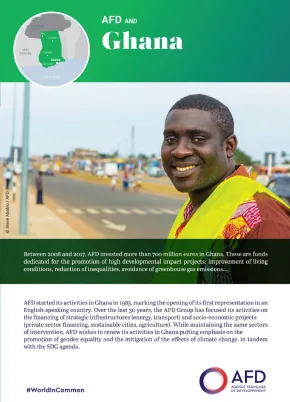Share the page
Ghana
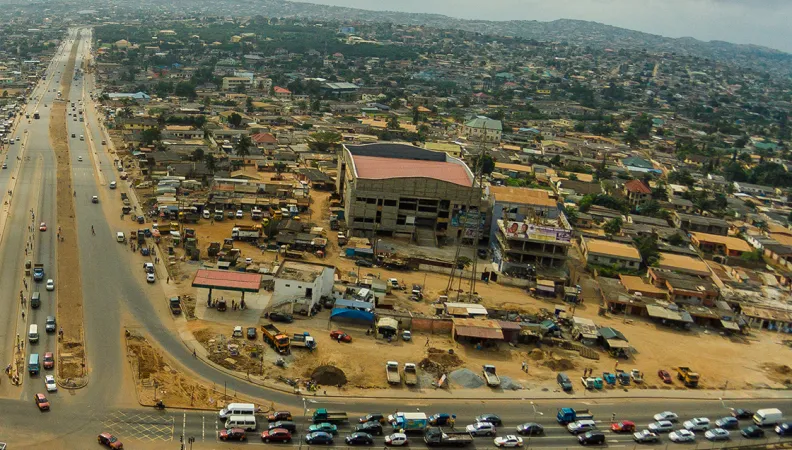
Between 2008 and 2017, AFD invested more than 700 million euros in Ghana. These are funds dedicated for the promotion of high developmental impact projects: improvement of living conditions, reduction of inequalities, avoidance of greenhouse gas emissions, etc.
Context
Despite its remarkable growth, Ghana’s economy needs to face three challenges: the decline in world prices for most of the raw materials exported by the country (gold, cocoa), the sharp fall in oil prices, which has halved its oil revenues, and an electricity grid which is still underdeveloped and unstable. Ghana must now diversify its economy and increase its energy supply.
AFD started its activities in Ghana in 1985, marking the opening ofits first representation in an English-speaking country. Over the last 30 years, the AFD Group has focused its activities on the financing of strategic infrastructures (energy, transport) and socio-economic projects (private sector financing, sustainable cities, agriculture). While maintaining the same sectors of intervention, AFD wishes to renew its activities in Ghana putting emphasis on the promotion of gender equality and the mitigation of the effects of climate change, in tandem with the SDG agenda.
AFD in Ghana: over EUR 1.4bn committed over the past 30 years.
AFD's Ghana office is directly attached to the Guf of Guinea regional office in Abidjan.
Our approach
"AFD and Ghana: developing strategic infrastructures and reducing inequalities"
Agriculture, the backbone of the Ghanaian economy, which employs about 50% of the labour force, saw its share of the country's GDP drop steadily to 19% by the end of 2016. To address this down turn, the Ghanaian government has rolled out flagship programmes such as Planting for Food and Job, One village-One dam, and Planting for Export and Rural Development.
For the last 15 years, AFD on its part has been supporting rural communities in the north of the country to strengthen the rice sector. More than 5,000 ha of lowland rice have thus been cultivated, thereby contributing to reduce the country's dependence on rice imports. lt has also helped to increase the technical skills of more than 7,500 producers leading to high output. ln addition, towards the south of the country, AFD has supported 8,800 Outgrowers in the last 20 years to develop 30,000 ha of rubber plantations which contributed in increasing their income and empowering them to provide basic amenities for their families.
AFD is currently working, together with the European Union, on the Agricultural Water Management Project in Upper West, which aims at increasing the income of 11,000 farmers, and irrigating 2,800 ha of farmland, thus empowering these farmers and helping them to attain a higher standard of living.
With urban population growth estimated at 3.6% per year, the urbanization rate in Ghana is expected to reach 65% within 15 years, which means nearly 23 million Ghanaians will reside in urban areas by 2030.
To help mitigate the negative effects of this rapid urban population growth, AFD which has been supporting and financing Ghana's decentralization and urban development for the last 1 0 years, is now focusing on urban mobility and sustainable smart cities. Through its Ghana Urban Management Pilot Project (GUMPP) for instance, AFD has financed infrastructure needs (markets, slaughterhouses, drains, neighbourhood rehabilitation, etc.) of four Ghanaian cities (Kumasi, Tamale, Sekondi-Takoradi and Ho). AFD is also supporting the upgrade of road and drainage infrastructures (the Lake Road and Aboabo Drain) as an extension of the Kumasi By-pass project which ended in 2013.
As a result of these interventions, less time is spent in traffic, the incomes of beneficiaries have improved while communities now live in healthier environments thus reducing epidemics resulting from poor sanitation and flooding.
Access to reliable and clean electricity is at the heart of AFD's mandate for the energy sector in Ghana, a sector that has experienced significant challenges in recent years (shortages from 2012 to 2016). Supporting the government's energy policy, particularly in search of a low-carbon development trajectory, both in terms of production and transmission of electricity, is therefore a priority.
Thus, AFD has supported the Volta River Authority (VRA) for the rehabilitation of the Kpong hydroelectric power station. Moreover, AFD is supporting GRIDCo to strengthen Ghana's electricity network and its regional integration. Under this flagship project, 330 kV high-voltage line has been constructed on the Kumasi-Bolgatanga major road as well as the construction of the interconnection line with Burkina Faso. These interventions are helping to reduce losses on power production lines, increase the supply of energy (particularly clean energy), as a catalyst of development, thereby helping Ghana to fit into the trajectory of a net exporter of electricity to its neighbour.
Also, AFD is implementing its Green Finance programme (SUNREF) in Ghana: it provides green credit lines to local banks as well as technical assistance to various stakeholders, both public and private. The program aims at supporting renewable energy and energy efficiency projects for corporates and local SM Es thus facilitating access to finance to this target group and supporting Ghana's environmental and energy transition.
With regards to the recent key challenges identified in the "Coordinated Programme of Economie and Social Development Policies 2017-2024", AFD has the ambition to produce intellectual material together with research institutions, think tanks or donors. The first initiatives have been launched in the Cocoa Value Chain and lnequalities (including Gender).
AFD now puts gender high on its agenda, with the ambition to be among global agencies of reference with regards to gender equality. This can only be done if AFD is able to track and measure the impact of her projects on women and men, to see if there are any gaps that need to be bridged or any lapses to be addressed. This will ensure that its projects adequately achieve gender equality leading to the empowerment of women. ln line with this, AFD organised a conference on "Gender Equality through Agriculture" in November 201 8, alongside the Canadian High Commission, to share ideas and experiences among stakeholders, including the Government of Ghana.
In the field
Below, find the country's projects, news, publications, and contact details in one click.
News & Press Releases
“More tech companies are developing in Africa than in the rest of the world”
Published on June 8, 2023
Key figures
-
705 million euros committed since 2008
-
63 projects funded in 10 years
-
8,800 outgrowers benefit from an increase in their incomes

